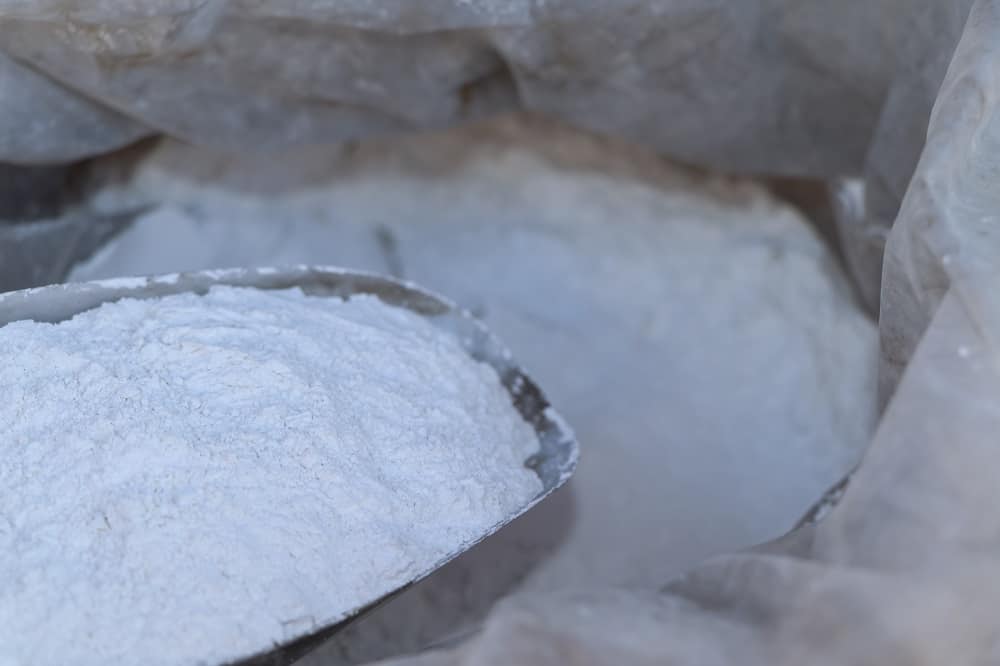Calcium carbonate is a common ingredient that can be found in many ingredient lists across a wide array of products. It is used in food for many reasons such as for fortification, as a buffering agent, and a stabilizer. The substance is also used for non-food products such as cosmetics and medications. Given its relative ubiquity, it is important to determine whether calcium carbonate is vegan or not.
Calcium carbonate is suitable for vegan diets. While it can also be obtained from animals that naturally produce calcium carbonate such as corals, seashells, and eggshells, food- and pharmaceutical-grade calcium carbonate is often either derived from quarrying or synthesized from calcium hydroxide and carbon dioxide.
Table of Contents
Calcium Carbonate

Comprising more than 4% of the earth’s crust, calcium carbonate (CaCO3) is a very common mineral. While calcium carbonate naturally occurs in the animal kingdom in corals, seashells, and eggshells, most of the calcium carbonate in nature occurs in the form of chalk, limestone, and marble (1).
Calcium carbonate is a common ingredient added to food as it serves many different functions. In food, it is used as an exempt color additive. This means that it is a color additive that does not require FDA certification (2). As a colorant, calcium carbonate is used in soft and hard candies and mints (3).
Calcium carbonate is also used as a stabilizer – a substance that increases the stability and thickness by helping food remain in an emulsion and retain certain physical characteristics. Calcium carbonate is often used in dairy products for this purpose.
Calcium carbonate is also used as a preservative. Aside from adding calcium carbonate to food items to prolong their shelf-lives, calcium carbonate is also used to extend the shelf-life of minimally processed food and vegetables (4).
Fruits, vegetables, canned meats, and fish products can also benefit from calcium carbonate. In these food items, calcium carbonate is used as a firming agent – a food additive added to precipitate pectin which results in strengthening the structure of the food and helps prevent it from collapsing.
Aside from food, calcium carbonate is also used in a wide array of products.
Toothpaste requires abrasives to help scrape off plaque from teeth. While silica is a common abrasive used, calcium carbonate is also conventionally used in toothpaste.
Antacids also make use of calcium carbonate because of its natural alkalinity. Aside from calcium carbonate, other basic buffers are also used such as aluminum hydroxide, magnesium carbonate, magnesium trisilicate, magnesium hydroxide, and sodium bicarbonate.
Beyond consumer products, calcium carbonate is also used in many other industries such as for building and constructing, sugar refining, paints, sealants, glues, iron production, and soil additives.
Is Calcium Carbonate Vegan?

While calcium carbonate can be sourced and extracted from animal sources such as coral, seashells, eggshells, and pearls, industrially produced calcium carbonate is primarily produced through quarrying and synthesis. Thus, calcium carbonate is a vegan ingredient.
Calcium Carbonate Synthesis
In 2019, the calcium carbonate market was estimated to be valued at USD 43.89 billion. This value was calculated to grow at a rate of 2.8% through 2020 to 2027 (5). To meet the increasing global demand for calcium carbonate, the substance is produced on an industrial scale through two primary methods.
First, calcium carbonate is quarried through naturally occurring mineral deposits such as calcite, aragonite, and sedimentary chalk. The mined deposits are then turned into a slurry with each mineral component (including calcium carbonate) isolated and purified for different purposes (6). For food and pharmaceutical purposes, calcium carbonate can also be obtained from pure marble.
Second, calcium carbonate can also be produced by precipitating dissolved calcium hydroxide and carbon dioxide. The characteristics (e.g., particle size) of calcium carbonate can be controlled easier when produced this way.
Food that Contains Calcium Carbonate
Calcium carbonate is used for a number of reasons (e.g., calcium fortification, food coloring additive, preservative, acidity buffer, regulator, stabilizer, and firming agent) in food which is why it can be found in a wide array of food items.
Examples of food items that contain calcium carbonate include soy milk, breakfast cereals, pastries, packaged fruits and vegetables, sweets, biscuits, fortified beverages, nutritional bars, and soups and sauces.
Aside from food, calcium carbonate is also used in a wide array of products that people use every day.
Toothpaste and other dental products also contain calcium carbonate both as an abrasive and as a teeth whitener. Calcium carbonate is also used in medications as a common filler for tablets. Due to its alkaline nature, it is also an active ingredient in antacids.
Calcium Supplementation
Calcium carbonate is also a common active ingredient used in calcium supplements. It is one of two commonly used calcium sources along with calcium citrate.
Calcium supplementation is a way to help certain people add calcium into their systems. Different situations can call for calcium supplementation such as those with conditions that limit calcium absorption (e.g., Crohn’s disease, inflammatory bowel disease, etc.) or osteoporosis.
People with certain diets are also recommended to supplement calcium; High-protein and high-sodium diets can benefit from calcium supplementation as these diets promote calcium excretion more than other diets.
Vegan diets can also highly benefit from calcium supplementation since individuals with vegan diets are not consuming conventional food items that are rich in calcium such as dairy.
While calcium carbonate is discussed to be perfectly suitable for vegan diets, it is important to check the ingredients list of a supplement bottle to check the inactive ingredients as these can potentially be non-vegan. Common non-vegan ingredients found in supplements can include gelatin (in soft gel capsules) and shellac (a tablet-coating).
Calcium Carbonate from Animal Waste
Since calcium carbonate is a highly important material for many different industries, and not only for food and other consumer products, many studies and technologies are being developed to make use of calcium carbonate sources from waste. For example, technologies are currently being developed to extract calcium carbonate from oyster shells, seashells, and eggshells (7, 8).
While these studies are currently aiming to use the calcium carbonate extracted from these sources as polymer additives (e.g., cement, plastics, etc.), this can also potentially reach food industries.
While using animal-derived products are strictly against dietary veganism, it is debatable especially to environmental vegans whether calcium carbonate produced this way is vegan or not because calcium carbonate produced this way did not directly harm the animals for its production, and is instead being used as a way to reduce waste.
Is Calcium Carbonate Safe?
In general, calcium carbonate is safe for consumption. The mineral is a good source of calcium which is needed by the body for healthy bones, muscles, nervous system, and heart.
The FDA (Food and Drug Administration) lists calcium carbonate under substances that are generally considered as safe with no limitation other than good manufacturing practice (9).
The EFSA (European Food Safety Authority) also considers calcium carbonate as a safe food additive. No ADI (acceptable daily intake; maximum amount of substance that can be consumed daily without any adverse health effects) is required for calcium carbonate since calcium carbonate does not pose any toxicological concern (10).
References
5. https://www.grandviewresearch.com/
6. https://onlinelibrary.wiley.com/




